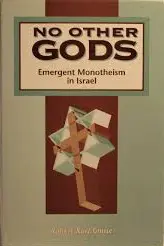

No Other Gods: Emergent Monotheism in Israel
in Library of Hebrew Bible/Old Testament Studies
Pages
392
Publisher
T&T Clark
Published
5/1/1997
ISBN-13
9781850756576
The author discusses the theological, social, and ideational implications of our new understandings of ancient Israel's social and religious development.
Reviews
Sheffield: Sheffield Academic Press, 1997. Pp. 392, Cloth, $78.00, ISBN 1850756570. Susan Ackerman Darmouth College Hanover, NH 03755 Robert Karl Gnuse's thesis in this book is that, given the new archaeological models that describe the emergence of nascent Israel out of Canaan in c. 1200 BCE and given the new history-of-religions models that describe the emergence of Israelite religion out of Canaanite religion, Israelite monotheism also needs to be understood as "emergent." More specifically, for Gnuse, "[T]he basic thesis of this work [is] that. . . monotheism developed over the course of many centuries in the ancient world . . . and that these developmental stages often come in 'bursts' in response to particular social and religious crises" (p. 16). Even more specifically, Gnuse understands Israelite monotheism as developing throughout the first six centuries of Israel's history and as coming to full expression only in response to the social and religious crisis of the exile. As Gnuse readily admits, this thesis is hardly unique to him: indeed, he describes most of the current generation of biblical scholars who discuss the emergence of monotheism as favoring an evolutionary model that culminates with a full-blown expression of monotheism in the exilic period. Moreover, he cites Rainer Albertz, Othmar Keel, Bernhard Lang, and Mark S. Smith as scholars who share his more particular belief that this evolutionary process occurred in "bursts" or through "a chain of revolutions [e.g., the revolt of Elijah, Elisha, and Jehu, the reforms of Josiah, and the crisis of exile] which follow one upon another in rapid succession" (pp. 141-142). But if Gnuse's basic thesis is not in and itself new, then what is the purpose of this book? At one point, in his conclusion, Gnuse claims that his goal is to "make such ideas more available to the general reader" (p. 350). Yet the last sentence of the book suggests otherwise, stating that "This work is designed to further the direction of scholarly thought in this generation and to provide some speculative grist for the minds of scholars, theologians, and students of religion" (p. 356).
[Full Review]
